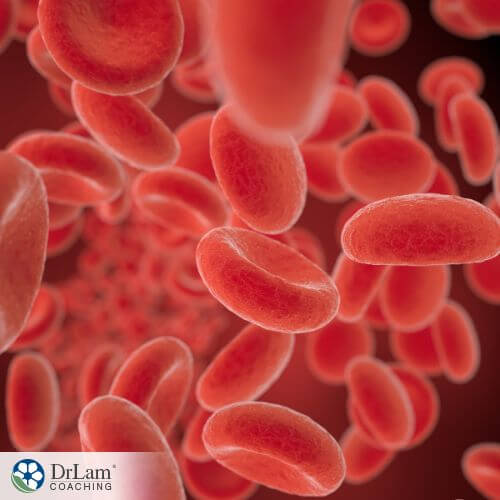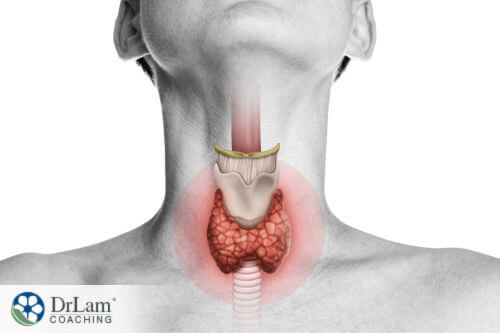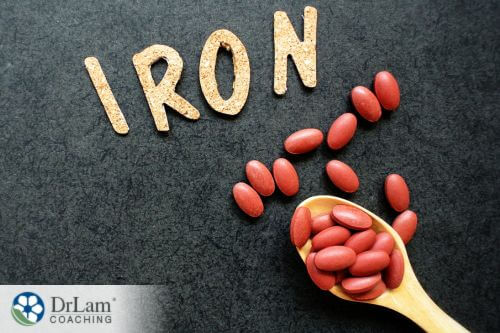Iron is a mineral that your body needs for optimal functioning. This mineral plays many important roles such as maintaining your blood health and supporting growth and development. One of the markers of iron stores within your body is ferritin. This article will take a closer look at ferritin, what it means if you have low ferritin, and what to do about it.
 Ferritin is a protein within your body that stores iron. It is the main storage for iron within your body. It is also responsible for iron balance within the body (1). This protein is generally found within your body cells as opposed to your blood. While most cells contain ferritin, your liver and immune system cells contain a higher concentration.
Ferritin is a protein within your body that stores iron. It is the main storage for iron within your body. It is also responsible for iron balance within the body (1). This protein is generally found within your body cells as opposed to your blood. While most cells contain ferritin, your liver and immune system cells contain a higher concentration.
Your cells will release iron from ferritin when your body needs it. Since ferritin is the main storage of iron, it can be used as a marker of how much iron is stored in your body (1).
A blood test is generally used to measure your level of ferritin. This result will either be in range, high, or low. In some cases, you may be advised to refrain from eating 12 hours before the test as it can impact the ferritin levels.
Low ferritin is generally when your ferritin levels are below 30 ng/mL. However, this may differ between different labs (2). Symptoms of low ferritin levels include:
The effects of low ferritin within the body are widespread and can affect different organs such as the adrenal glands and thyroid gland. It can also affect your reproductive health, with studies showing that women with low ferritin levels are at an increased risk for infertility, miscarriage, and having infants with a low birth weight.
There are a range of individuals who may be at risk for low ferritin levels; these include:
There are multiple different causes of low ferritin levels. These factors include:
Symptoms of low ferritin can be confused with those of a common stress-related condition, adrenal fatigue. Adrenal Fatigue Syndrome (AFS) is the non-Addison's form of adrenal dysfunction, where the body's stress response cannot keep up with life's chronic stressors. Your body can cope with short-term stress, mainly through the adrenal glands and the NeuroEndoMetabolic (NEM) Stress Response System, a six-circuit system of related organs and systems in the body. However, in long-term stress, your adrenal glands can become depleted, and imbalances within your NEM system can occur. Symptoms of AFS will depend on in which circuit in the NEM system the imbalance is.
 One of the circuits is your Hormone circuit, which is responsible for regulating the hormones within your body. The three organs responsible for the functioning of this circuit are your adrenal glands, thyroid gland, and reproductive organs. Imbalances within this circuit can cause a range of different symptoms such as fatigue, weight gain, low libido, irregular periods, and infertility. These organs are not only affected by stress but also by low ferritin and can give similar symptoms.
One of the circuits is your Hormone circuit, which is responsible for regulating the hormones within your body. The three organs responsible for the functioning of this circuit are your adrenal glands, thyroid gland, and reproductive organs. Imbalances within this circuit can cause a range of different symptoms such as fatigue, weight gain, low libido, irregular periods, and infertility. These organs are not only affected by stress but also by low ferritin and can give similar symptoms.
There is also an interesting relationship between low ferritin and AFS. AFS can reduce the health of your thyroid gland, which can then reduce ferritin stores. On the other hand, however, low ferritin stores can reduce the amount of cortisol produced and can also reduce the health of your thyroid gland and reproductive organs.
This makes it important to visit your healthcare provider if you are experiencing these symptoms. Your healthcare provider will be able to conduct tests to determine the cause of your symptoms and develop a plan to manage them.
Whilst some factors that can cause low ferritin levels are out of your control and may need professional guidance, nutrition is one way in which you can improve your ferritin levels. Getting more iron in your diet and boosting its absorption are key to improving ferritin levels.
In nutrition, there are two different types of iron: heme and non-heme iron.
Heme iron is the iron available in meat sources such as beef, chicken, and turkey. Whilst the white meats do contain iron, red meats contain more. This form of iron is absorbed well by your body.
The second type of iron is non-heme iron. This type of iron is available in plant-based protein. Some sources include:
Non-heme iron isn't absorbed as well as heme iron. This means that to receive optimal iron, you may need to consume more sources of non-heme.
Whilst nutrition can impact the quantity of iron you receive from food, it also can affect the absorption of iron. Certain compounds and nutrients can reduce the absorption of iron from food, These include:
Whilst these compounds may reduce the absorption of iron, you do not need to eliminate them from your diet. Certain practices such as soaking soy products and whole grains can help to remove the phytates and improve the absorption of iron. Additionally, having these products separately and not with a meal that is rich in iron can help to reduce their effect on iron absorption.
On the other hand, some nutrients can help increase iron absorption. These include:
Adding sources of these nutrients and compounds may help to increase the absorption of iron from your meals (3).
 If you are concerned that you are not reaching your iron recommendations through nutrition, an iron supplement can assist. There are a range of different iron supplements available. Some include a range of different nutrients along with iron, whilst some only include vitamin C along with iron for better absorption. The amount of iron you will need depends on your age and gender. These recommendations are bare minimum to not be iron-deficient:
If you are concerned that you are not reaching your iron recommendations through nutrition, an iron supplement can assist. There are a range of different iron supplements available. Some include a range of different nutrients along with iron, whilst some only include vitamin C along with iron for better absorption. The amount of iron you will need depends on your age and gender. These recommendations are bare minimum to not be iron-deficient:
Note that if you have iron deficiency, you might need much higher amounts of iron (around 60mg daily for adults) to replenish the body's stores. Whilst iron supplementation can be effective at improving your iron levels, it may cause stomach cramps, constipation, or grey/black stools. Some of these symptoms can be relieved by drinking enough water, increasing fiber intake, and including fruits and vegetables in your diet.
In addition, it is essential that you talk to a doctor about adding an iron supplement to your diet and that you avoid taking too much. High levels of iron can be dangerous.
If you are concerned about taking iron supplements or have an underlying health condition, chat with your healthcare provider first before you try a new supplement regimen.
Ferritin is a protein that is critical for your health. Low ferritin levels can cause multiple symptoms. Fortunately, low ferritin levels can be improved by consuming more iron from food as well as enhancing the absorption of iron by consuming it with vitamin C or lactic acid. It also helps to avoid consuming compounds like calcium, tannins in tea, and phytates that reduce iron absorption in the same meal.
The range of symptoms that low ferritin can cause can mimic the symptoms of AFS. If you are currently experiencing these symptoms and would like some guidance, the team at Dr. Lam can assist. For assistance, you can call us directly or click here for a free initial call.
“Antioxidants Effects in Health.” ScienceDirect, www.sciencedirect.com/book/9780128190968/antioxidants-effects-in-health.
Barney, Jonathan. “Iron.” StatPearls - NCBI Bookshelf, 10 July 2023, www.ncbi.nlm.nih.gov/books/NBK542171
Milman, Nils. “A Review of Nutrients and Compounds, Which Promote or Inhibit Intestinal Iron Absorption: Making a Platform for Dietary Measures That Can Reduce Iron Uptake in Patients With Genetic Haemochromatosis.” Journal of Nutrition and Metabolism, vol. 2020, Sept. 2020, pp. 1–15. https://doi.org/10.1155/2020/7373498.
If you are taking iron supplements, these supplements might start working and increase low ferritin stores in as little as 14 days. However, it can take up to three months to begin to see effects. Your healthcare provider may run frequent blood tests to monitor your ferritin levels.
